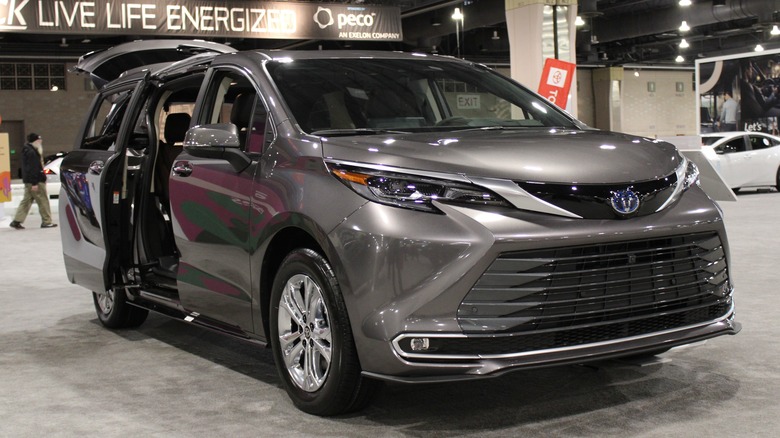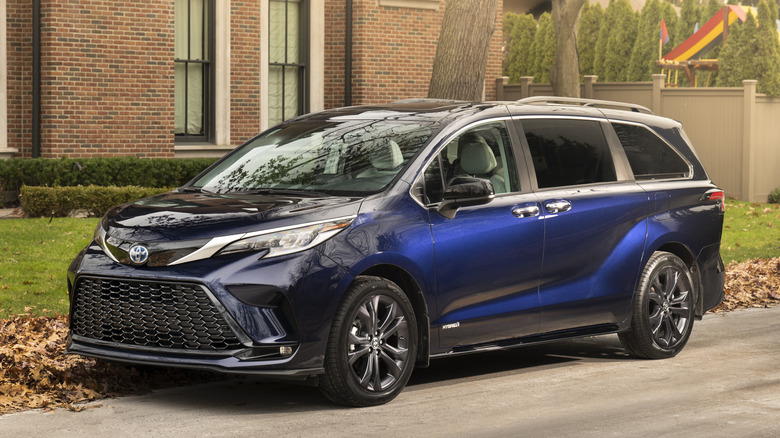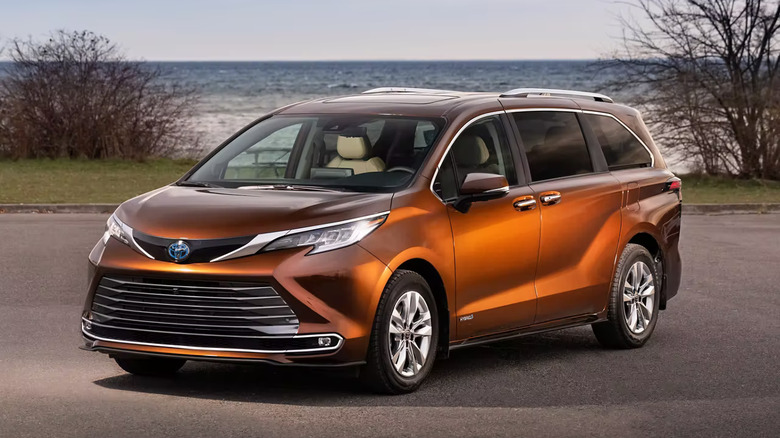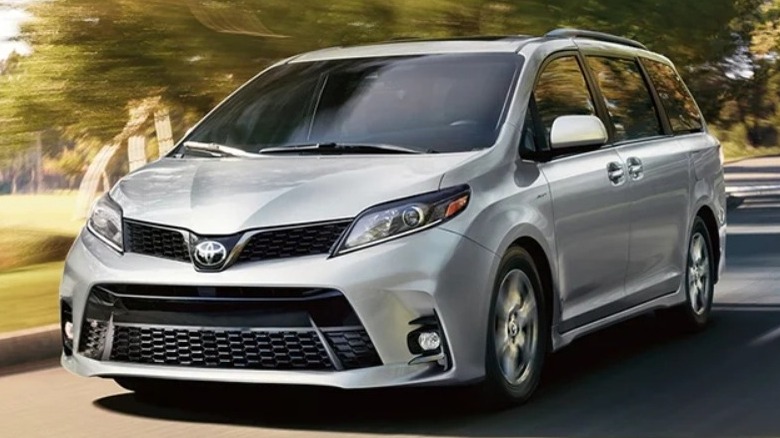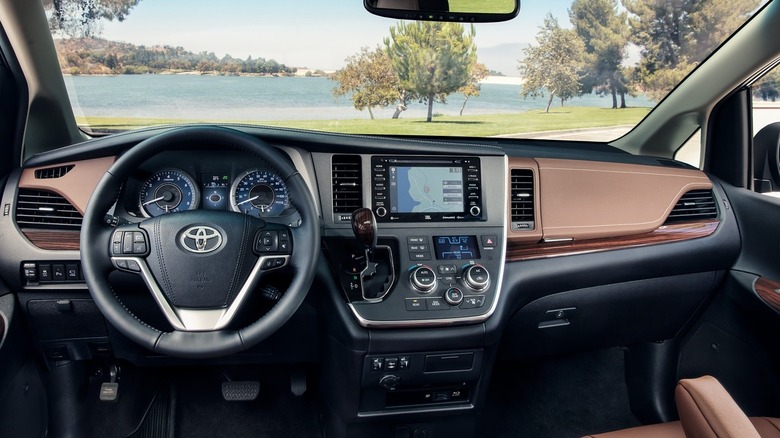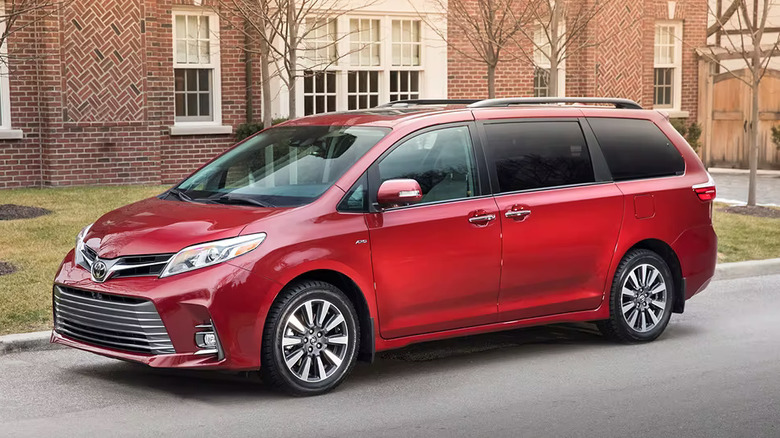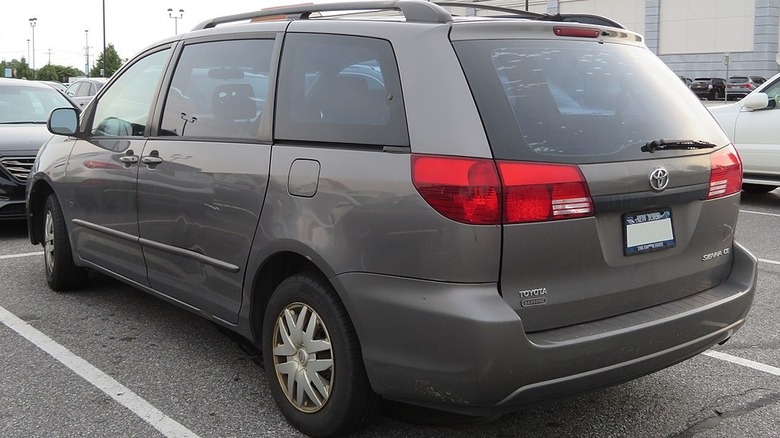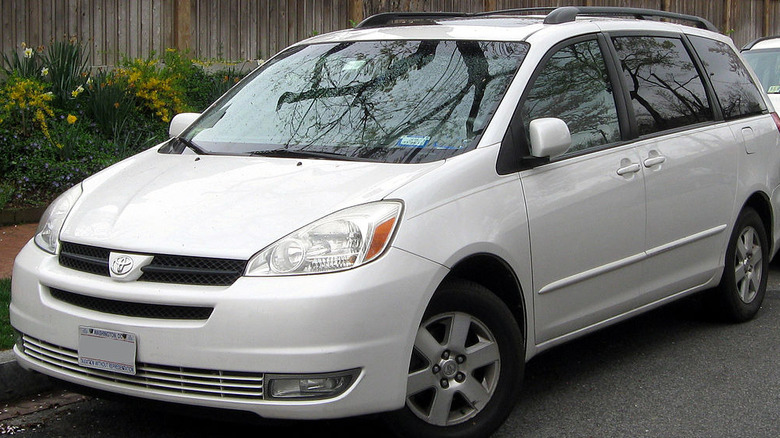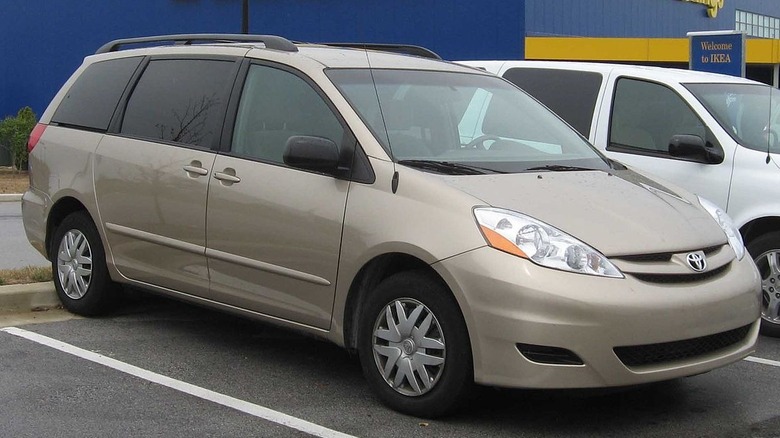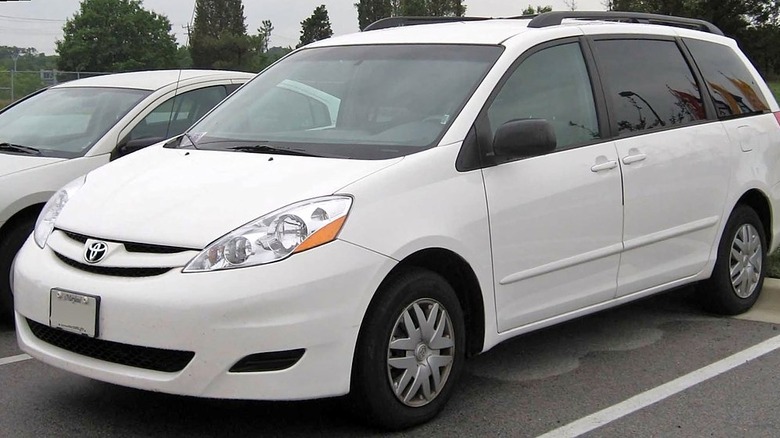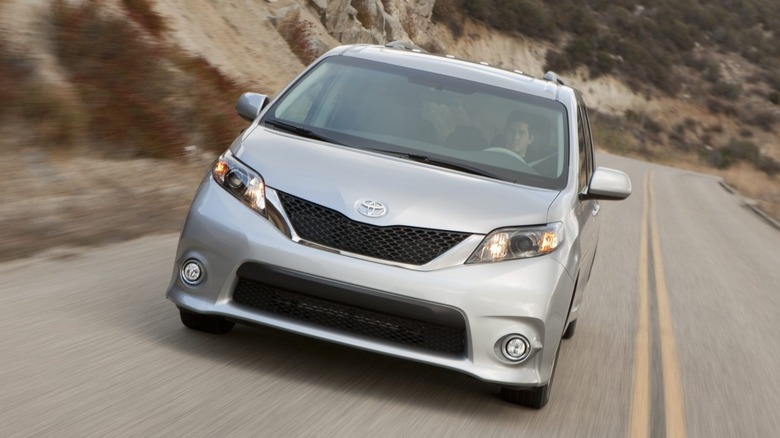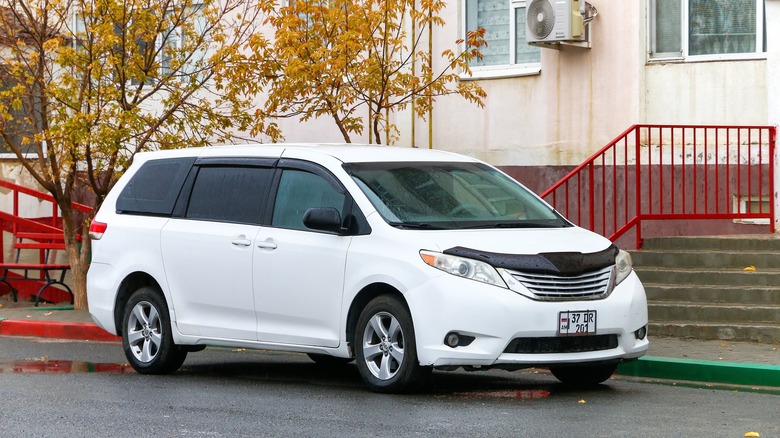Toyota Sienna: The Best Years To Buy (And The Ones You Should Steer Clear Of)
When I was in the market for a minivan years ago, my choice came down to the classic Toyota Sienna versus Honda Odyssey debate. I did my homework before heading to the used car lot, and found that most Siennas had admirable crash test ratings, whereas the Odyssey didn't quite measure up. There was also the matter of price — Siennas were a bit more affordable, though the Odysseys did give off more elegant vibes.
I wasn't in the market for a fancy car, though, just something with A/C that could cart kids around — even better if it was a Toyota. There are plenty of reasons why Toyota owners are so loyal, and chief among them is the fact that there are so many reliable options to choose from. I previously drove a Toyota Camry that lasted through multiple generations in my family. Yet each model of Toyota has some years that are best avoided, and that's the case with the Sienna, too.
As it's one of Toyota's major models, it's not surprising that the Sienna also has the potential to run into problems. Yet it's worth noting that the Sienna comes in sixth in terms of consumer complaints against Toyota vehicles, per CarComplaints' count, well behind trusted models like the Tacoma, the RAV4, and the Camry. Even the worst Sienna may not be a terrible buying option — and I say this as the owner of a 2004 Toyota Sienna that we will encounter later on this list.
The rankings here are based on National Highway Traffic Safety Administration (NHTSA) and CarComplaints.com data, while safety ratings are provided by the Insurance Institute for Highway Safety (IIHS). Here are the models of Toyota Sienna worth seeking out, along with the ones you should probably avoid.
Best: 2022 Toyota Sienna Hybrid
While the 2023 to 2025 Toyota Sienna Hybrids also top the list of the best year Siennas to buy, they're not included in this ranking as there isn't enough data from the NHTSA yet to determine if there are significant flaws.
The 2022 Toyota Sienna Hybrid, however, has been on the market long enough to build up some data with the NHTSA, and it hasn't received nearly as much of the negative press that earlier and non-hybrid Siennas have. In fact, the Sienna Hybrid was the top safety pick of 2022 by the IIHS. Based on a scale of Good to Poor, the 2022 Sienna Hybrid earned all Good markers. Overall, its safety rating was superb, and it earned a Superior front crash prevention rating.
Safety isn't the only good reason to buy a 2022 Sienna Hybrid. Newer Sienna Hybrids are surprisingly fuel efficient at around 36 mpg, and the 2022 Sienna ranks similarly. Compared to my older, non-hybrid minivan, that's a steal on gas. A gas-powered 2010 Sienna gets around 18 to 19 mpg (combined city and highway), for example.
It's worth noting that Toyota didn't make a standard Sienna in 2022, so this isn't comparing apples to apples in that sense. In fact, Toyota seems to be on a streak of only manufacturing hybrid minivans since 2021. However, be aware that these cars have retained their value — a used 2022 Toyota Sienna Hybrid costs around $36,000.
Best: 2021 Toyota Sienna Hybrid
Another great pick for a modern but gently used Siennas is the 2021 Toyota Sienna Hybrid, which has received very few consumer complaints with the NHTSA, has only had one recall since it was released, and earns high safety ratings. In addition, the hybrid Sienna was a top safety pick by the IIHS in 2021.
Only one airbag recall impacted the 2021 Sienna Hybrid, and there have been plenty of manufacturer communications on best practices for keeping your minivan in good condition. However, nothing catastrophic has come of the 2021 yet, so it's on our list of the best years to buy. In addition, it gets excellent fuel economy at 35 mpg.
Like any car, there will be issues that crop up, and some drivers report specific issues with various systems. For example, the batteries on the Hybrid Siennas are meant to last for the life of the vehicle, but it's possible they can degrade the same as a standard battery. While there are no guarantees a 2021 Sienna won't have any issues, it seems to have far fewer than alternative models. Like other recent Toyotas, a used 2021 Toyota Sienna Hybrid holds its value well, which means that a used model starts at around $33,000.
Best: 2020 Toyota Sienna
Toyota enthusiasts won't be surprised to find out that plenty of the top-rated Siennas aren't hybrids. After all, Toyota has been making the Sienna since the late 1990s, and after a few decades in, it's reasonable to expect that the company has more or less perfected the ICE formula.
To date, the 2020 Toyota Sienna has only had two NHTSA recalls and very few complaints. The two recalls were related to potential fuel pump failure and possible steering loss. Both issues were repaired for free by Toyota, with fixes involving new parts. The steering issue impacted less than a thousand Siennas, whereas the fuel pump problem affected over 1.5 million consumers. All things considered, two major repairs aren't bad for the 2020 Sienna — and that's coming from a Sienna owner who's been to the shop too many times to count for various miscellaneous manufacturer repairs.
Complaints and recalls aside, the 2020 safety ratings from the IIHS are higher than many other Toyotas. Not everything is perfect with this year, however, as the IIHS did give some Marginal and Poor ratings to aspects of the car's structure and safety cage. Overall, crashworthiness ranged from Marginal to Good, and crash avoidance was solid. Gas mileage is also a bit lower than some surrounding years at 21 mpg combined city and highway. If you are in the market for one, a used, base-model 2020 Toyota Sienna starts at around $30,000.
Best: 2019 Toyota Sienna
The 2019 Toyota Sienna is yet another top pick if you're in the market for a used minivan. However, the 2019 Sienna is an older generation — third versus 2021 forward being fourth generation — you would be right to expect a few more issues. To date, the NHSTA reports that the 2019 Sienna has had seven recalls, two of which were the same fuel pump issue as the 2020 Sienna. Other issues were either not as widespread, with several affecting less than 1,000 examples, while others were as minimal as an incorrect load carrying label applied to some Siennas.
Although the 2019 Sienna didn't have any manufacturer investigations, the NHTSA did receive some complaints about the van. Most of these were related to the fuel system, which isn't surprising given the associated recalls. The 2019 also had similar safety ratings to the 2020 Sienna, with the IIHS giving it some Marginal labels on crashworthiness. The 2019 Sienna also gets tolerable gas mileage for a non-hybrid minivan with 22 mpg combined city and highway.
Interestingly, a 2019 may not be the cheapest option, based on availability and dealership estimates. According to Edmunds, a used 2019 Toyota Sienna costs around $33,000 in average condition, while one that is outstanding costs closer to $35,000. Given the apparent reliability, this might be a worthwhile investment.
Best: 2018 Toyota Sienna
Another third-generation Sienna is another smart pick if you're shopping used, as the 2018 Toyota Sienna has received few complaints and recalls while earning solid safety ratings with the NHTSA. The model year was, again, impacted by fuel pump issues, which explains most of the recalls and fuel system complaints from consumers. However, one thing to consider with a slightly older Sienna is that — assuming you're buying a well-maintained unit — most of the recall work will already have been completed. That doesn't mean nothing will go wrong, but it could mean less time spent at your local Toyota dealer waiting to get back on the road.
Toyota's 2018 Sienna also earned decent safety ratings from the IIHS, with only one Marginal score overall, and some Poor points. In the scheme of things, it's not the worst option out there, especially compared to the models we recommend steering clear of. Fuel consumption isn't terrible, either, as a 2018 Sienna gets around 22 mpg combined city and highway, although the all-wheel drive model gets slightly less at 20 mpg.
A used 2018 Toyota Sienna costs around $26,000 in average condition according to Edmunds, while an outstanding quality van could run you around $28,000. As far as newer but not new minivans go, under $30K is a good deal, in my humble used-van-owning opinion.
Steer clear: 2004 Toyota Sienna
Unfortunately, the 2004 Toyota Sienna has one of the worst reputations among used Toyota models, and I have firsthand knowledge as to why. I haven't had any catastrophic issues with my Sienna, but I have experienced some of the failures other consumers complain about.
I was already shopping for a decade-old model because of budget, but I compared safety ratings to choose the best minivan. I ultimately decided that the Sienna was a safer bet; Honda's Odyssey got a markdown from the IIHS for having "more steering wheel movement than is desirable," while both vans maintained the driver's survival space well. Unfortunately, my favorite minivan also had the most NHTSA complaints with more than 2,000. CarComplaints even notes that the most-reported problem for any Sienna was the 2004's dashboard cracking issue.
Still, this is where the Toyota loyalty comes in. Despite the dashboard cracking not posing a safety hazard — according to Toyota — the manufacturer replaced it for free anyway. To this day, my 2004 Sienna's dash looks amazing. However, I've also experienced the issue of a power door opening on its own — fortunately at low speeds, and only twice — and the lift gate hydraulics failing. A bonk on the head and $30 later, we were good to go.
All that said, the 2004 Sienna is definitely one of the used Toyotas you should steer clear of, especially because it's so old now. Plus, a 2004 Sienna only goes for about $2,200 now, so I'll be driving mine into the ground, thank you.
[Featured image by Kevauto via Wikimedia Commons | Cropped and scaled | CC BY-SA 4.0]
Steer clear: 2005 Toyota Sienna
Better than worst is good, right? Maybe not so with the 2005 Toyota Sienna. Per the NHTSA, the 2005 model year doesn't fare much better than the 2004. With over 1,100 consumer complaints, six investigations, and 12 recalls, the 2005 Sienna didn't earn many fans during its first few years, and it's probably not a good buy now.
NHTSA complaints run the gamut, from complaints about electronic stability control to worries over latches/locks/linkages, brakes, and structure, all of which include a ton of different components. The recalls were also varied, with some for seat heater wiring, spare tire assembly issues, and power steering problems that could prove fatal if components failed while the vehicle is driving. Various manufacturer bulletins inform consumers about issues like rain causing parts to erode, brakes possibly squeaking while still being safe, and other minor issues that sound like they would make a 2005 not-so-fun to drive.
While the 2005 Sienna still has a decent safety rating per the IIHS, its head restraints — of all things — received Marginal and Poor ratings. That, combined with the many consumer complaints, suggests that there are far better options than the 2005 Sienna on the market today, including used minivans. However, these cars' ages and issues are reflected in their current price — a used 2005 Toyota Sienna costs around $2,500 today in pristine condition, while an average model might run $2,100.
Steer clear: 2006 Toyota Sienna
Most of the issues on older Toyota Siennas are covered by manufacturer recalls, which means you're only wasting time at the Toyota dealership rather than paying out of pocket. With the 2006 Toyota Sienna, it seems that there are not only the standard manufacturer recalls, but also pricey problems that Toyota won't take ownership of.
According to the NHTSA there have been 11 recalls of the 2006 Sienna that had Toyota repairing the seats and equipment, although granted not all recalls impacted every model in that year. What a fun gamble, right? Still, costs can add up when it comes to the things Toyota won't fix.
How hard will it hit your wallet? The worst problem according to data compiled by CarComplaints is a rack and pinion seal failure that costs $1,100 to repair. With an older Sienna, that might be far more than drivers are willing to pay, especially if the car itself isn't valued very highly — Edmunds lists this model year at around $2,200 in average condition, or $2,700 in outstanding shape.
Beyond repair issues, there are some safety concerns, per the IIHS, with head restraints and seats on this year again getting Poor ratings. That doesn't mean the 2006 Sienna is unsafe, but it means that other years have safety improvements that could mean better outcomes in accidents.
Steer clear: 2008 Toyota Sienna
With hundreds of consumer complaints, a handful of recalls, and the fact that it's getting up there in age, there are definitely better options than a 2008 Toyota Sienna.
Most of the manufacturer recalls on the 2008 weren't serious fixes — some label issues and replacement wiring affected a few thousand vans, but not all of the model year. However, for those impacted by the electrical issues, this was no doubt a big deal as Toyota reported that the electrical shorts could risk the burning the seat or potentially harm the seat's occupant.
Common complaints listed with the NHTSA, however, were related to things like speed control, electrical systems, and the power train trailing behind. There were also some safety concerns lodged by the IIHS. This was another bad year for head restraints and seats in the Sienna, though nearly everything else was rated Good.
All things considered, the 2008 Toyota Sienna's used cost of around $3,000 for an average model doesn't sound like a screaming deal, nor does $3,600 sound great for an outstanding condition car. Given how many issues the vehicle has had, steering clear of this year is probably the safest bet.
Steer clear: 2011 Toyota Sienna
Finally, the last Sienna year that you should steer clear of is the 2011 Toyota Sienna. Based on the NHTSA's data, this model has had the most recalls to date of any Sienna on the market. It's closely followed by the 2005, 2006, and 2004, of course, but the 2011 had 14 recalls over the years. Most of the recalls centered on air bags, while some impacted the vehicle's seats.
Yet, despite consumer frustration, the 2011 Sienna earned the IIHS's top safety pick rating for 2011. If you do own or plan to buy a 2011 Sienna, at least safety won't be the very top concern. It could still cost you, however, as hundreds of customer complaints indicate issues with air bags, the electrical system, structure, and more. CarComplaints highlighted a higher amount of engine problems in the 2011 versus any other type of issue, with reported problems that include premature tire wear, loose inner tie rods, and sliding door malfunctions. Clearly, those power doors need some help in multiple years, but some seem to perform better than others.
Fortunately, by 2012, Toyota seemed to have learned its lesson; the 2012 Sienna has a reputation for being one of the most reliable Toyotas ever built. However, it didn't make our ranking for the best five here because other models scored better based on NHTSA ratings. Prices start to go up with this year, however, as a used 2011 Toyota Sienna can cost around $8,300 in average condition or up to $9,800 in perfect shape.
Methodology
The ranking methodology for best and worst Sienna models comes from personal experience obtained with this model during my own purchase of Toyota Sienna alongside a comprehensive review of the National Highway Traffic Safety Administration (NHTSA) data. That data includes a record of consumer complaints, manufacturer recalls, and manufacturer bulletins.
The Sienna years with the least number of complaints are arguably the best, while the ones with the most complaints are the worst. We've also factored in vehicle recalls, although recalls don't always mean a directly performance rated issue.
Data comes from both the NHTSA and CarComplaints.com, which sources its complaint data independently. While safety ratings didn't play a factor in the ranking, these are also included for consumer information and to specify whether safety concerns may have played a part in a vehicle's consumer complaints. Safety ratings come from the Insurance Institute for Highway Safety (IIHS).
